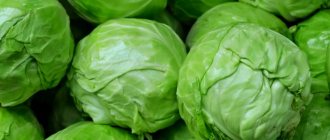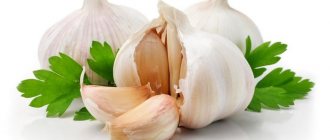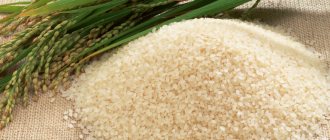When looking for foods that are approved for breastfeeding mothers, women often ask whether greens can be consumed while breastfeeding. After all, it is good for health. Today we will talk about what greens lactating women can eat and when, as well as what they should still avoid.
When breastfeeding, it is important for a mother to know which greens can be included in her diet from which month after birth.
Recommendations for consuming greens during lactation
- In the first month, a nursing mother should eat greens only after heat treatment, because such food is easier to digest. Stew or boil greens, add to soups and main dishes;
- After the third or fourth month of lactation, you can eat fresh greens and combine them in salads with other vegetables. What vegetables can a nursing mother eat, see the link;
- The first time you try it, eat a small portion of greens after cooking. Monitor your child's condition for two days. If allergies or other negative reactions are not observed, this type of greens can be eaten without risk to the baby;
- If an allergy appears or colic intensifies, it is better to postpone the inclusion of greens in the menu for 3-5 weeks. Then try again.
- Do not introduce several types of greens into your diet at the same time! Take intervals of at least 2-3 days;
- Start including greens in your diet with dill, then you can introduce parsley, green salad, cilantro, etc.;
- When breastfeeding, you should not use mint and sage; you can use sorrel, oregano and basil with caution;
- Carefully select, wash and process foods before cooking. Take only fresh greens without yellow stems and leaves, without spots and black spots;
- You can drink herbal decoctions and infusions only after consulting a doctor, since many herbs cause allergies in infants.

You need to be careful when choosing greens, since not every type is safe for babies. Each type of greenery is characterized by a certain composition and properties. Let's look at what you can eat while breastfeeding.
Recipes with greens for moms
In addition to herbal infusions and decoctions, mommy can prepare other delicious dishes with herbs:
- Homemade cheese. To prepare, take 1 liter of kefir and 0.5 liter of sour cream. Mix the products. Line a colander with gauze folded in 4 layers. Pour the mixture of dairy products into it, tie it and hang it to drain the whey for 8-12 hours. Salt the resulting cream cheese and add fresh chopped parsley and dill to it.
- Celery cocktail. To prepare, take 1 liter of kefir, 4 plant stems and 1 tbsp. water. Combine all ingredients in a blender and grind.
- Parsley for the skin. To improve the appearance of your face, squeeze the juice from fresh herbs and mix it with sour cream. Apply the mask to your face for a quarter of an hour and rinse off.
Greens are good for mom and baby. It contains many vitamins and is good for restoring the body after childbirth. But you need to use it carefully, gradually introducing it into your diet. Heat treatment and strict adherence to pediatricians' recommendations will help reduce the likelihood of allergies.
Dill
Dill is the most useful herb for breastfeeding, as it has a positive effect on milk production. Dill and fennel are often included in a decoction or tea for lactation. And dill water helps a newborn with severe colic. Dill is useful for both the nursing mother and the baby, so such greens are introduced into the diet already in the first month!
You can include dill in your diet already 7-10 days after the baby is born. It perfectly helps with colds and coughs, insomnia and stomach disorders, calms, relieves stress and headaches. The consumption rate of dill during lactation is up to 50 grams per day.
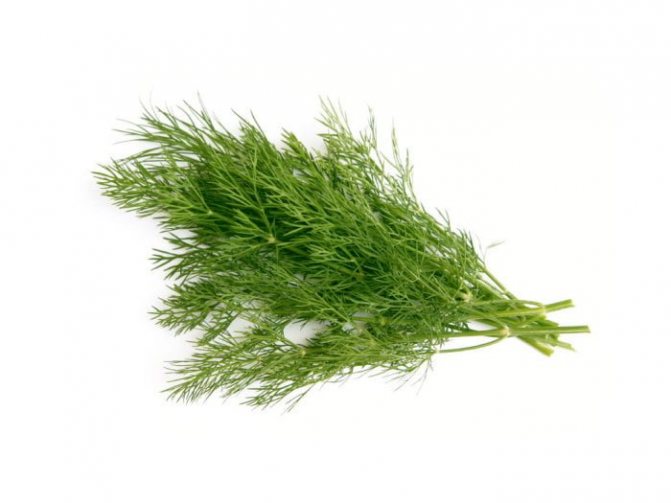
Beneficial features:
- Strengthens the immune system;
- Strengthens lactation;
- Removes mucus and clears the airways;
- Stabilizes the functioning of the intestines and digestion, improves appetite;
- Dilates blood vessels and prevents heart disease;
- Normalizes blood pressure;
- Relieves tension and improves sleep;
- Dill infusions and oils effectively heal wounds, help with inflammation and itching of the skin, and dill decoction is used to treat throat and bronchitis.
Dill is not recommended for use if you have kidney stones, low blood pressure or allergies.
Dill has gained popularity as a folk remedy for colic in infants. To prepare dill water, take 3 grams of crushed dry dill seeds and pour a glass of hot water. Leave for an hour and then filter. This remedy can be drunk by a nursing mother or given to newborns a teaspoon before or after feeding three to four times a day.
Can a nursing mother eat greens and what kind?
The consumption of greens by lactating women has always been accompanied by a lot of questions. After all, its active composition and presence in most essential oils can bring not only benefits, but also harm. Most green plants are allowed to be eaten while breastfeeding.
Most often, greens are recommended to be introduced into the diet 3–4 months after birth, when the baby’s body is strong enough to react normally to new foods. In addition, at this age, colic usually ends, so the risk of negative gastrointestinal symptoms decreases. There are also prohibited greens, which are not dangerous to the health of the mother and baby, but can reduce the production of breast milk, which is extremely undesirable during breastfeeding.
In the first weeks, first month after birth
Some herbs are medicinal and can therefore be used from the first month. But remember that the use of greens during this period is recommended only after consultation with a doctor, since the benefits must outweigh the risks.
It is not recommended to eat greens in the first weeks without heat treatment. So, it is allowed to eat dill, but it is better if it is slightly boiled in the soup and not added to the salad. Tea with added herbs is allowed as an exception.
Dill
Dill is considered the safest herb during breastfeeding. Dill can be eaten within a week after giving birth. It is often included in tea for lactating women, as it has a beneficial effect on the functioning of the child’s gastrointestinal tract. Dill may help relieve colic. Dill water is given directly to infants to get rid of increased gas formation. A nursing mother should not eat more than 50 g of dill per day. The plant has the following properties:
- helps get rid of stress;
- reduces headaches;
- strengthens the immune system;
- normalizes blood pressure, etc.
Parsley
Parsley is very useful for breastfeeding. It contains a large number of substances, for example, vitamins B, C, iron, potassium, magnesium, etc. Such greens strengthen the immune system, increase hemoglobin levels, help cope with viral diseases, improve the functioning of the cardiovascular system, etc. Women note that eating parsley has a beneficial effect on lactation. Parsley is allowed in the first month after birth. It is useful to make an infusion from it to stimulate hepatitis B. To prepare, pour boiling water over a tablespoon of parsley and let it brew under the lid for half an hour. Drink this drink throughout the day and you will soon notice that there is more milk.
Green onions
Many women, especially those who gave birth before the summer season of the appearance of greens, are often interested in whether green onions can be breastfeeding. After all, it has a good effect on the immune system, helps fight viruses, flu, etc. Many people believe that eating green onions has a negative effect on breastfeeding, as it worsens the taste of breast milk. In fact, with moderate consumption this will not happen. The product is recommended to be eaten from 3–4 months of a baby’s life. Remember that excessive amounts of onions can cause abdominal pain, bowel problems or vomiting in the baby, so stick to the recommended dosage - no more than 30 g per day of heat-treated green onions.
Leafy green salad
When looking for products to diversify their diet, women often wonder whether lettuce leaves are ok for breastfeeding. This product is allowed to be eaten 2 weeks - 1 month after birth. The product is rich in vitamins and minerals. It is not an allergen and is not accompanied by digestion difficulties. Start using 1-2 leaves, and gradually increase the amount to 100 g.
Celery
Celery during breastfeeding is recommended to be introduced into the diet 3 months after birth. The product contains components that can cause colic and increased gas production in the baby. The plant has a beneficial effect on the immune system, gastrointestinal tract, heart, blood vessels, etc. It helps cope with postpartum depression and improves skin condition. Do not eat more than 5 g of celery per day, and more than 15 g of the plant per week.
Sorrel
Sorrel, especially in the form of soup, is on the list of many women's favorite foods. It contains many vitamins, minerals, and organic acids, which is why you need to eat sorrel while breastfeeding. It is best to eat the product 3-4 months after giving birth. It is not recommended to consume more than 50–100 g of the plant per day. It can be eaten as an independent dish, added to salads, soups, etc.
Spinach
Spinach is no less useful for breastfeeding than sorrel. It has the following properties:
- strengthens the immune system;
- enriches the body with useful substances;
- normalizes metabolism;
- prevents the development of cancer;
- improves skin condition, etc.
Since the concentration of active substances in it is lower than in sorrel, it can be eaten by a baby from 2–3 months. Don't eat too much spinach; it's best to limit yourself to 50-100 grams per day.
Cilantro
Cilantro contains many vitamins and minerals. It strengthens the immune system, improves digestion, removes cholesterol, and has a beneficial effect on the functioning of the cardiovascular and nervous systems. During breastfeeding, cilantro is introduced into the diet 2–3 months after birth. It is best to first try dill, parsley, etc. It is not recommended to eat more than 35 grams of the product per day.
Melissa
Melissa is very useful during breastfeeding. It is called a women's herb, as it has a beneficial effect on the hormonal background of women and helps to quickly recover after childbirth. In addition, it normalizes the functioning of the nervous system, improves sleep, helps with stress and depression, and reduces pain, especially during menstruation. It also has a beneficial effect on lactation. According to general rules, lemon balm can be eaten from 3 months, but the doctor may allow drinking tea with lemon balm from the first month after birth.
Parsley
Parsley contains vitamins B1 and B2, K, folic acid and iron, potassium, magnesium and other important minerals. Parsley is equivalent in vitamin A content to carrots, and superior in vitamin C content to other types of greens. Therefore, it perfectly strengthens and supports the immune system, effectively resists viral and infectious diseases, and helps with colds.
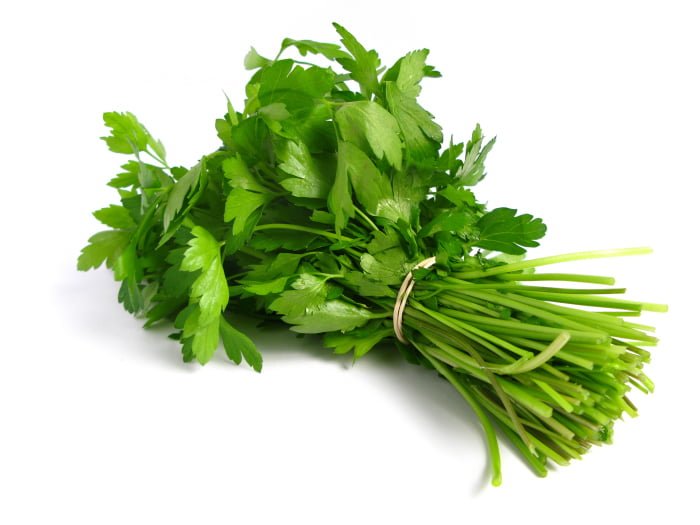
Useful action:
- Improves lactation;
- Increases immunity;
- Relieves swelling, removes harmful substances and cleanses the body;
- Normalizes digestion and improves appetite;
- Responsible for blood clotting;
- Helps calcium to be absorbed in the body;
- Stabilizes the functioning of the kidneys and liver;
- Strengthens gums and whitens teeth;
- Restores hormonal levels;
- Tones the skin, improves the condition of nails and hair;
- Parsley infusions heal wounds, relieve skin irritation and help with insect bites.

Parsley is also on the list of foods that increase lactation. In addition, these are low-calorie greens, so they are suitable for diet menus and weight loss. You can try parsley while breastfeeding 3-4 weeks after birth.
Strained infusion of parsley helps with a lack of breast milk. Pour boiling water over fresh herbs and soak for 30 minutes. The infusion can also be used to wipe the skin. Freeze the broth and wipe your skin every morning. This procedure will improve and even out the complexion, relieve swelling and make the skin fresh.
Green onions
Green onions are the best prevention of viral and infectious diseases containing phytoncides. These are natural antiseptics that protect the body from colds and flu. Green onions form and strengthen the immune system, help cope with fatigue and prevent vitamin deficiency. Some people believe that onions, even green onions, can affect the taste of breast milk. But if you don’t overeat and follow the dosage, this won’t happen!
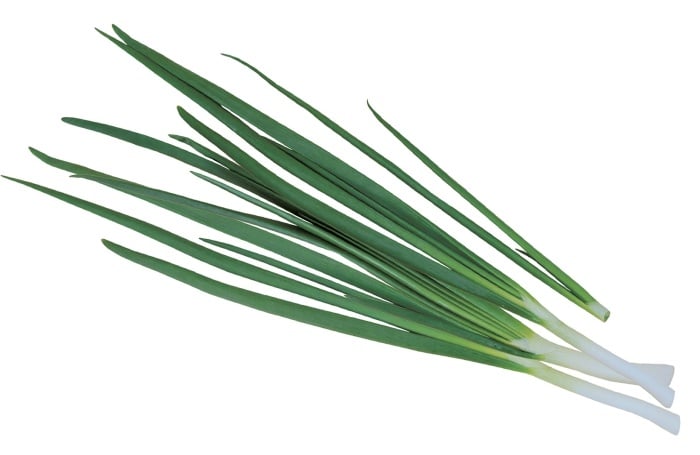
Useful features:
- Increases immunity and protects against vitamin deficiency;
- Improves bowel function and helps nursing mothers with constipation;
- Due to the high content of phosphorus and calcium, it improves dental health and strengthens gums;
- Strengthens blood vessels and stabilizes heart function;
- Green onion juice helps with hemorrhoids, treats skin inflammation;
- Increases blood pressure.
It is not recommended to eat green onions if there are problems with the liver, diseases of the gallbladder and kidneys, or high blood pressure and hypertension. In addition, overeating green onions threatens heartburn and even vomiting in infants.
Leafy green salad
Lettuce is a healthy low-calorie product that is rich in vitamins and minerals. These greens are suitable for losing weight and restoring your figure, strengthening the immune system and improving metabolism. The product is easily digestible and does not interfere with digestion, rarely causes allergies, and is therefore safe for babies.
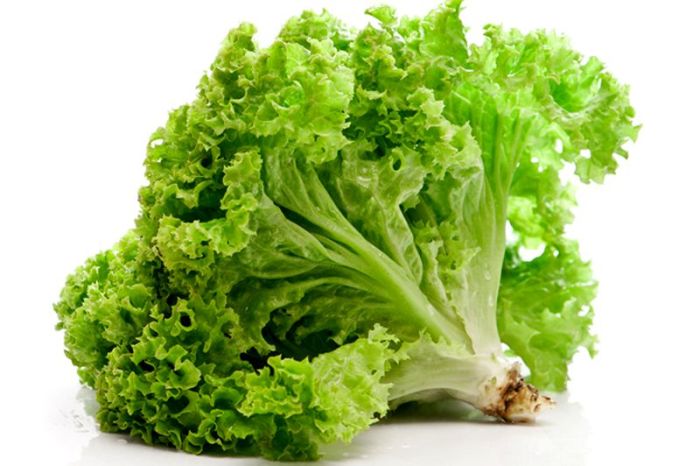
Useful action:
- Improves memory and stimulates brain activity;
- Increases immunity;
- Strengthens bones;
- Improves digestion, helps with ulcers and gastritis;
- Regulates metabolism;
- Gives vigor and energy, relieves stress;
- Preserves vision;
- Restores sleep;
- Improves the condition of hair, skin and nails.
Due to the content of oxalic acid, lettuce leaves are not recommended for people with problems with the liver, kidneys or bladder.
Pediatricians recommend introducing green salad into your diet a month after the baby is born. At first, eat 2-3 leaves and gradually increase the dose. Remember that you cannot drink the salad, as it consists of 92% water! The combination of liquid and lettuce leaves causes stomach upset.
Celery when feeding a baby
Celery is a spicy seasoning that gourmets love to add to salads, main courses, and creamy soups. However, it contains components that can negatively affect the condition of a nursing mother and baby. It is recommended to try it 3 months after birth, monitoring the baby’s digestion. Initially, it should be cooked stewed or boiled, adding to gravy, meat or broth. The roots and leaves can be tasted raw only in the 6th month of lactation.
The daily intake of celery for a nursing mother is 5 grams, the weekly intake is up to 15. There is an opinion that a cocktail made from it enhances lactation, but excessive consumption of this type of greenery can lead to digestive upset in a baby. You need to eat celery, but in moderation. Then it fully reveals its healing properties:
- strengthening the immune system,
- weight loss after childbirth,
- fight against depression, apathy,
- regulation of the thyroid gland,
- relief from cystitis,
- maintaining the functioning of the heart and kidneys.
Celery
Celery strengthens the immune system and improves digestive function. The stems of the plant provide comfortable digestion of food, and the juice helps you lose weight. However, such greens cause increased gas formation and colic in infants. Therefore, celery is recommended to a nursing mother only after the third month of lactation.
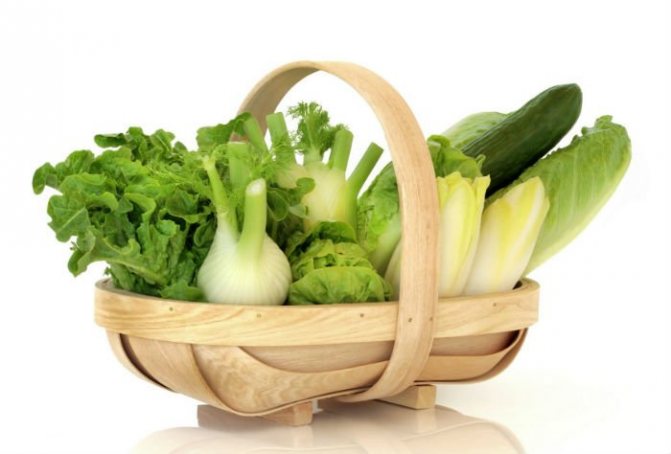
Beneficial features:
- Improves material metabolism;
- Strengthens the immune system;
- Promotes weight loss;
- Improves mood and helps cope with depression;
- Slows down the aging process;
- Supports the functioning of the heart and blood vessels;
- Stimulates brain functioning, improves memory and vision;
- Regulates the functioning of the thyroid gland;
- Helps with cystitis.
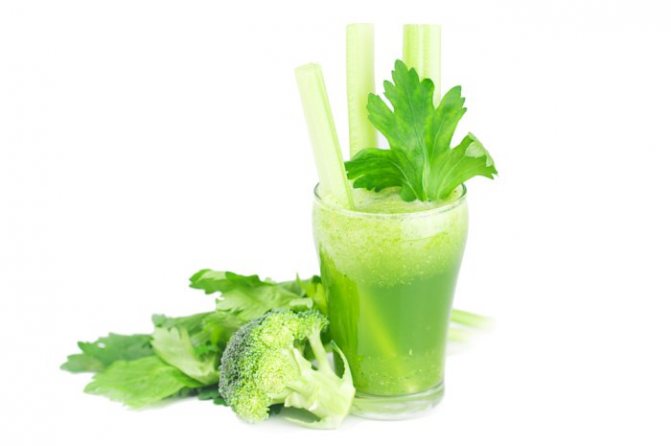
The daily norm of celery is 5, weekly – 15 grams. Chew a small piece for the first time. After the first introduction, eat greens only in stewed or boiled form. You can eat fresh celery six months after the baby is born. By the way, such greens are suitable for preparing not only various dishes, but also cocktails.
How to eat herbs, greens and onions during lactation?
The concept of “green” is quite general. Each variety of herbs used in cooking has its own beneficial properties and aroma. They have different effects on the taste and production of milk, which determines the appetite of the newborn and his readiness to breastfeed. The following rules will help to diversify the diet of a new mother with parsley, onions, mint, celery and other herbs:
- in the first postpartum months, herbs are subject to heat treatment, which will help avoid problems with the baby’s tummy,
- first you should add parsley and dill to the menu, then onions, cilantro, basil and other favorite herbs,
- after the third month, it is recommended to season salads and broths with fresh herbs, starting with a small amount,
- if allergies, colic, or gas formation occur in an infant, the consumption of fresh herbs is postponed for a couple of weeks,
- You should not introduce several varieties of greens into your diet at the same time; the break between new products is at least 3-4 days,
- Herbal infusions can cause allergies in infants, so it is important to use them only after consultation with a doctor.
Sorrel
Sorrel is a vitamin plant containing the potassium salt of oxalic acid, which gives the plant its characteristic sour taste. Such greens effectively help with colds and coughs, remove toxins and cleanse the body, and reduce allergic reactions.
Sorrel is an excellent substitute for white cabbage in soups or stews. After all, it is known that such cabbage is not recommended for consumption in the first six months while breastfeeding. It is very difficult to digest and often causes severe colic and increased gas production in babies. Find out what kind of cabbage a nursing mother can eat here.
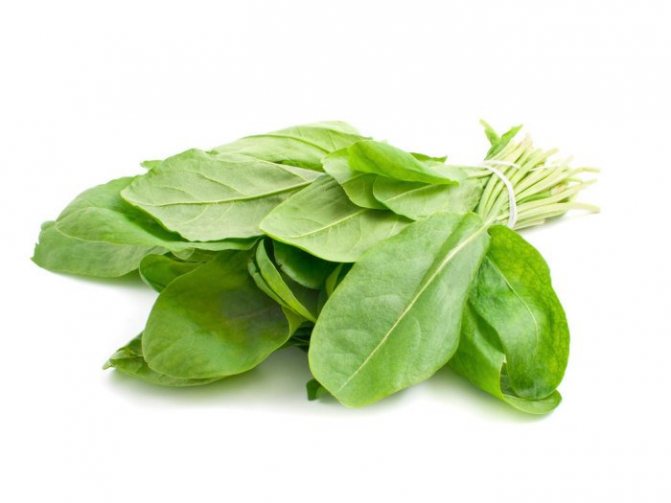
Beneficial features:
- Increases hemoglobin levels;
- Strengthens the immune system;
- Reduces cholesterol levels;
- Normalizes digestion, relieves inflammation in the gastrointestinal tract;
- Stimulates the functioning of the kidneys and liver;
- Cleanses blood vessels and the body, increases the elasticity of blood vessels;
- Improves the functioning of nerve cells;
- Stabilizes fat metabolism.
Sorrel should not be used for pancreatitis and ulcers, gastritis and kidney stones, or for disorders of salt metabolism in the body.
Only fresh sorrel leaves can be used for food, since old sorrel leaves accumulate a large amount of oxalic acid, which harms digestion and provokes the formation of kidney stones. To neutralize the aggressive effect of oxalic acid, you need to add a fermented milk product to the dish. For example, season the soup with sour cream, and the salad with natural yogurt.
Spinach
Spinach is a low-calorie product with minimal risk of allergies, which can also replace white cabbage in dishes. It cleanses and tones the body, restores strength and energizes. In addition, unlike many vegetables, it is easily digestible and does not cause distress or colic in a newborn.
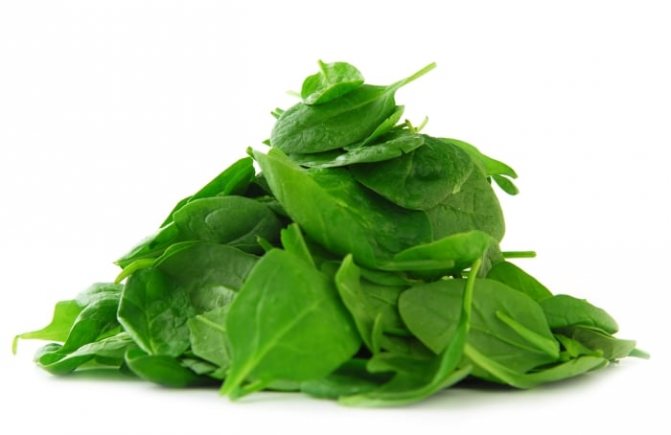
Useful action:
- Strengthens the immune system and protects against colds;
- Calms and relaxes, relieves fatigue and nervous tension;
- Improves mood;
- Cleanses the body of toxins and waste;
- Regulates metabolism;
- Improves the condition of skin and hair;
- Strengthens bones and prevents rickets in newborns;
- Relieves the condition of gastritis and ulcers, asthma and arthritis, helps with migraines and hypertension;
- Prevention of cancer.
Spinach is not recommended for use if you have colitis or problems with your kidneys and liver.
Spinach, like sorrel, contains oxalic acid, but in a smaller dosage. Therefore, it is safer for babies. In addition, greens are very low in calories, which helps reduce weight. During lactation, spinach can be consumed already in the second month of breastfeeding. You will find recipes for delicious, healthy dishes during lactation in the article “Spinach for a nursing mother.”
Cilantro
Cilantro contains folic acid, which ensures normal growth and development of infants. In addition, it contains vitamins P and C, group B, minerals and essential oils. Cilantro forms and strengthens the bone skeleton, immunity and nervous system. Therefore, it is very important for babies.

Useful action:
- Stimulates appetite;
- Strengthens the immune system and blood vessels;
- Improves the functioning of the kidneys, liver and digestion;
- Cleanses the body of bacteria, removes excess cholesterol;
- Improves sleep and relieves nervous tension;
- Helps with bleeding gums, strengthens teeth and enamel;
- Heals wounds, eliminates inflammation and improves skin condition.
Cilantro should not be consumed if you have diabetes, coronary heart disease and thrombosis, after a heart attack or stroke, or with individual intolerance. Cilantro is not recommended for use during pregnancy and for children under 1.5 years of age.
During lactation, cilantro should be introduced after more traditional types of greens (parsley or dill). For the first time, eat two or three leaves. Then gradually increase the dose. The recommended amount is no more than 35 grams of greens at one time.
Cilantro for a nursing mother
Spicy green coriander (cilantro) is often used for salads, seasoning for meat, and rich soups. It contains folic acid, minerals, vitamins B, C, P, and essential oils. Not everyone loves cilantro, but if a nursing mother is one of the fans of this herb, then it is recommended to include it in the diet after parsley, dill, and lettuce have been introduced. The recommended amount is up to 35 grams per day.
Cilantro, like other greens, should be introduced gradually. Its benefits for mother and baby are great:
- strengthening bones, tooth enamel, bleeding gums,
- relieving physical and mental stress,
- stimulation of the kidneys, digestive system,
- protection against pathogenic bacteria,
- removal of cholesterol from the body.
Contraindications for consuming cilantro are diabetes mellitus, a tendency to allergies, individual intolerance, thrombosis, ischemia, recovery after a stroke, heart attack. Babies under one and a half years of age do not need to add cilantro to ready-made dishes or give it on their own.
Basil
Basil is a source of iron, which is so necessary for babies and nursing mothers. In addition, it contains calcium, vitamins PP, A and K. Basil improves appetite and normalizes digestion, helps with frequent stress and insomnia. Basil can be eaten in small doses while breastfeeding.
But keep in mind that an increased rate leads to a decrease in breast milk production! There are special recipes for decoctions with basil, which lead to the extinction of lactation. Such decoctions are drunk at the end of breastfeeding. Despite the inhibitory properties of basil, the herb can be given to a nursing mother in small quantities and only after lactation has been established.

Useful features:
- Relieves spasms;
- Improves the functioning of the intestines and stomach;
- Heals wounds;
- Improves sleep and calms, relieves stress;
- Strengthens the immune system, helps with viral and infectious diseases, eliminates sore throat;
- Tones the body and improves mood;
- Reduces colic and alleviates food poisoning.
Basil can be consumed only in limited quantities during breastfeeding, as it reduces lactation. In addition, basil should not be eaten if you have heart problems or diabetes.
A decoction of basil before bedtime calms, relaxes and helps with insomnia. To prepare such a drink, pour 15 grams of dry herb with a glass of boiling water and leave for about an hour. This decoction can be drunk by a nursing mother after 4-5 months if the baby is not allergic to this herb.
Dill during lactation
Dill during breastfeeding is a popular component of tea to improve lactation, and doctors recommend dill water during colic in a baby (more details in the article: How should a nursing mother drink dill water correctly?). Equally useful for mother and baby, it is approved for use in the first postpartum month. The optimal time to include herbs in the menu is 7-14 days of a baby’s life. The norm for a nursing mother is no more than 50 grams of dill per day. The health benefits of the herb are great:
- help with colds,
- strengthening the immune system,
- increased milk production,
- normalization of high blood pressure,
- reduction of mental stress,
- normalization of digestion and sleep,
- dilation of blood vessels, prevention of heart disease.
During colic in a newborn, it is not always possible to purchase dill water at the pharmacy. You can make it yourself, which requires a teaspoon of crushed dill seeds. They are poured with a glass of boiling water, infused and filtered after an hour. A newborn should be given a teaspoon of warm dill water before or after feeding three times a day. It is not addictive and helps in the fight against colic. Contraindications to the use of dill are allergies, urolithiasis, low blood pressure.
Dill tea to improve lactation
If necessary, tea made from dill seeds will help a new mother to increase the production of breast milk. Making it is as easy as making water, the only difference is in the proportions. You need to take a tablespoon of dill seeds, pour a glass of boiling water over them and leave for 1 hour. Take the strained infusion several sips throughout the day.
A herbal cocktail is also suitable to improve lactation. You should grind a tablespoon of fennel seeds, dill, and aromatic anise. Brew a tablespoon of the mixture with a glass of boiling water, leave for 30 minutes, strain, drink in small sips half an hour before feeding the baby.
Oregano
Oregano has a lot of useful healing properties, but pediatricians do not recommend using this herb during lactation, as it can cause severe allergies in infants. A nursing mother can drink weak tea with oregano up to once a week for 4-5 months of lactation and only after consulting a doctor.
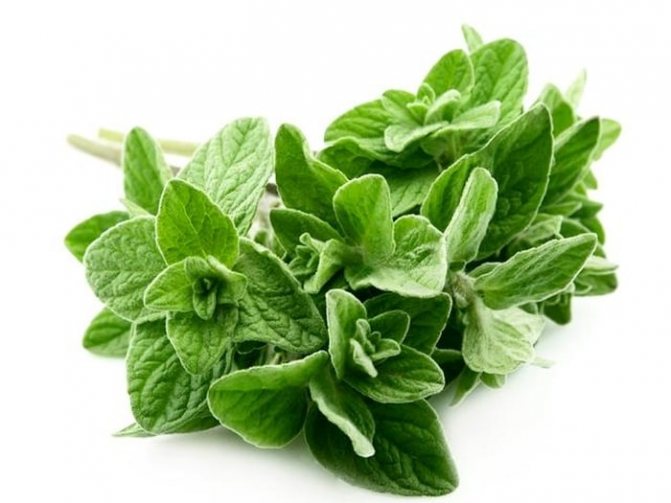
Beneficial features:
- Relieves pain and fever;
- Reduces temperature;
- Helps with colds and coughs;
- Improves digestion;
- Cleanses the body;
- Strengthens the immune system;
- Calms and relaxes;
- Normalizes the functioning of the reproductive system.
Oregano increases the tone of the uterus, which sometimes provokes miscarriage. Therefore, oregano is contraindicated during pregnancy.
Mint and sage
Mint and sage are herbs that should not be consumed while breastfeeding. They suppress lactation and reduce the volume of breast milk. Teas, infusions and decoctions with mint or sage are used when they want to complete breastfeeding.
Note that a small amount of mint does not have any effect on milk volumes. But when taken regularly, menthol in the herb has a negative effect on the release of fluid from the body. In addition, the types of mint that produce different effects are of great importance.
Sage is a natural remedy that contains phytohormones. It not only reduces breast milk production. Sage has a beneficial effect on the mental and physical state of a woman, has a rejuvenating effect, treats asthma and bronchitis, improves memory and maintains mental clarity.
Sage is prohibited for acute chronic diseases, breastfeeding and pregnancy.
Basil for breastfeeding
Basil is often used in cooking sauces and savory meat dishes. The unique composition of the herb is rich in iron, vitamin C, E, A, PP. It also contains a lot of sodium, potassium, zinc, and essential oils, which give it a rich aroma. The calorie content of basil is higher than that of many vegetables. However, it is consumed in small quantities, sometimes combined with other herbs.
A nursing mother is allowed to eat basil every day, but in moderation and only after lactation has been established. Excess grass in the daily diet leads to a decrease in milk production, which is used by women who want to stop breastfeeding. The herb is also contraindicated for diabetes, thrombosis and cardiac disorders. If everything is in order, basil will bring many benefits:
- relieves stress and cramps,
- improves sleep
- reduce colic,
- will increase immunity,
- eliminates sore throat,
- improves mood and appetite.
Soothing basil infusion
A healing decoction made from 15 grams of herb and a glass of boiling water will help you get the maximum benefit from spicy basil. The leaves are poured with water, kept in a water bath for 15 minutes, and infused. Drink 150 ml before bedtime, which will be calm and strong. The prescription should not be abused, but sometimes it will be a good replacement for sedatives.
